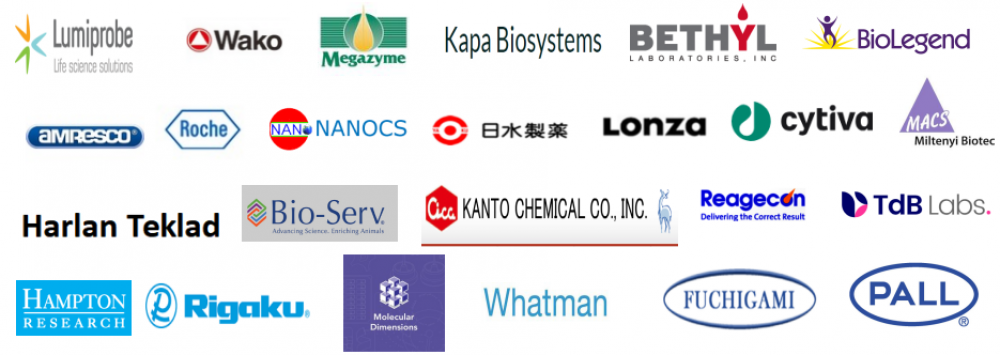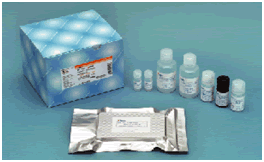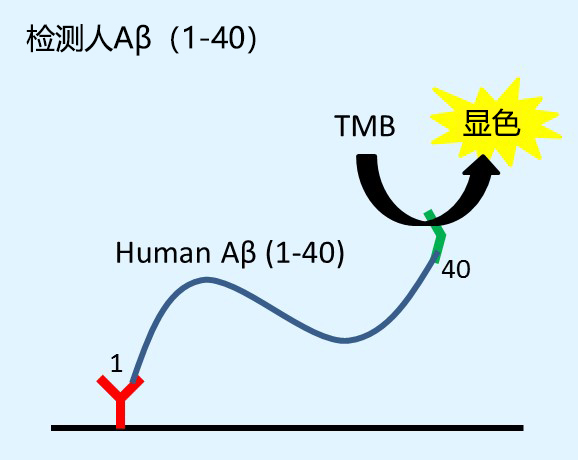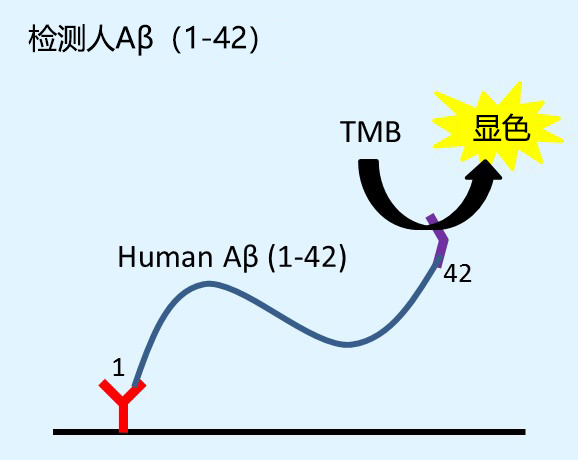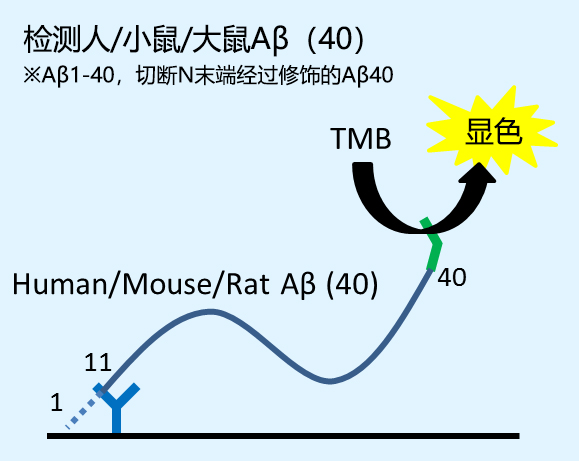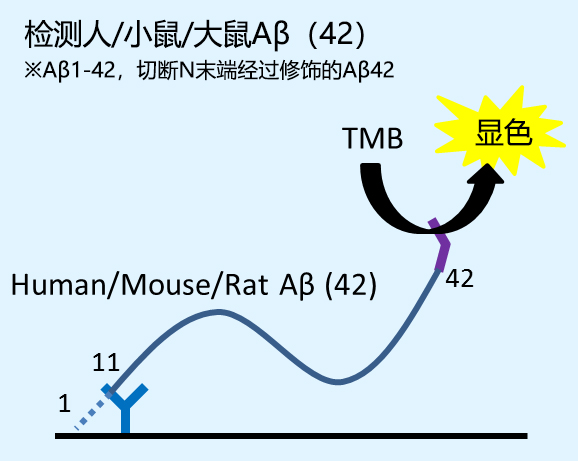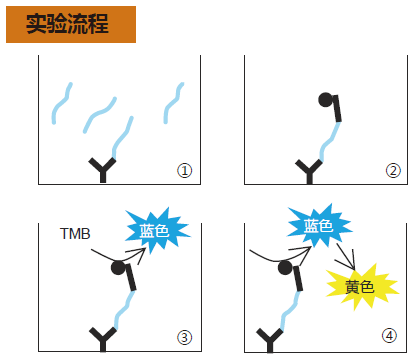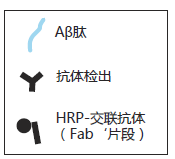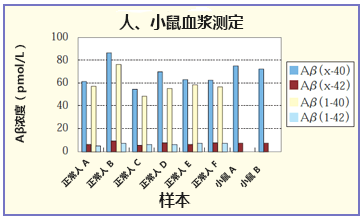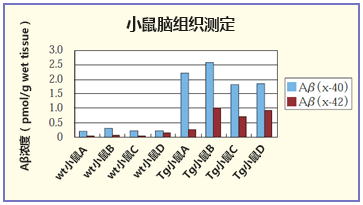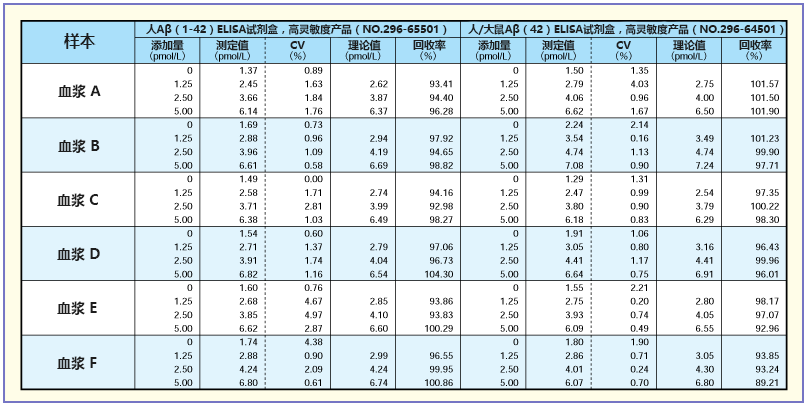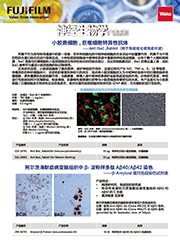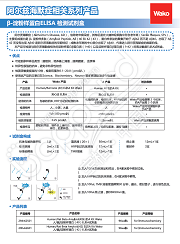| 产品名称 |
产品编号 |
CAS NO. |
规格 |
|
| Amyloid β Peptide 1-42, Human 人β-淀粉样多肽1-42 |
MP5401-1MG |
107761-42-2 |
1mg |
|
| Amyloid β Peptide 1-42, Human 人β-淀粉样多肽1-42 |
MP5401-5MG |
107761-42-2 |
5mg |
|
| Amyloid β Peptide 1-42, Human 人β-淀粉样多肽1-42 |
MP5401-25MG |
107761-42-2 |
25mg |
|
Aβ,英文名Amyloid β-protein,中文名β-淀粉样蛋白,具神经营养性和神经毒性,由β-淀粉样前体蛋白(APP)经β-和γ-分泌酶的蛋白水解作用产生的含39-43个氨基酸的多肽,由细胞分泌,沉淀聚积在细胞基质,此过程不仅与神经元的退行性病变有关,而且能激活一系列病理事件,包括星形胶质细胞和小胶质细胞的激活、血脑屏障的破坏和微循环变化等,是导致阿尔茨海默病(AD)患者老年斑周围神经元变性和死亡的主要原因。
Aβ(1-42,1-43)是构成老年斑和神经纤维缠结的主要成分,出现在AD患者的海马体、大脑皮层和杏仁核处。Aβ(39-43)是形成AD和晚期唐氏综合症患者淀粉样蛋白斑的主要组分。Aβ(1-42)可下调bcl-2且提高bax表达水平。此多肽通过作用于p75神经营养素受体来诱导神经死亡。
产品特性
- CAS NO:107761-42-2
- 同义名:Amyloid β-Peptide (1-42) (human); β-Amyloid (1-42), human; Amyloid β Protein Fragment 1-42;
- 分子式:C203H311N55O60S
- 分子量:4514.1g/mol
- 纯度:≥95%(HPLC)
- 外观:白色冻干粉
- 溶解性:溶于1% NH4OH/PBS(1 mg/ml),DMSO(0.4-4 mM)
- 单字母序列:DAEFRHDSGYEVHHQKLVFFAEDVGSNKGAIIGLMVGGVVIA
- 三字母序列:Asp-Ala-Glu-Phe-Arg-His-Asp-Ser-Gly-Tyr-Glu-Val-His-His-Gln-Lys-Leu-Val-Phe-Phe-Ala-Glu-Asp-Val-Gly-Ser-Asn-Lys-Gly-Ala-Ile-Ile-Gly-Leu-Met-Val-Gly-Gly-Val-Val-Ile-Ala
保存与运输方法
保存:-20℃避光干燥保存,一年有效。
运输:冰袋运输。
储存液制备
- 将低温保存的产品置于室温回温至少20min,低速离心;直接往瓶内加入1% NH4OH溶解粉末(1mg多肽加入70-80μl 1% NH4OH足够);
- 之后用1×PBS或者其他合适缓冲液稀释到1mg/ml;【注意】:由于多肽在1% NH4OH溶液不可长期保存,因此必须立即用合适的缓冲液将NH4OH/多肽溶液稀释到约1mg/ml的储存液浓度。
- 室温低速漩涡混匀(少于1min)。之后根据单次用量分装冻存,避免反复冻融。
- 【注意】:以上储存液制备方法仅做参考,若有特殊要求,可根据经验或参考文献进行其他方法的溶解。
注意事项
- 本品以冻干粉形式提供,可能因量少不易观察到。请直接加溶剂到瓶子内,漩涡震荡以确保充分溶解;
- 为了您的安全和健康,请穿实验服并戴一次性手套操作。
附录I:不同聚集形态的合成β-淀粉样多肽的制备方法(Preparing Synthetic Aβ in Different Aggregation States)【摘自文献:PMID: 20967580】
图:制备寡聚体和纤丝状Aβ1-42的流程汇总图
1) 用HFIP(六氟异丙醇)处理合成多肽,去除现存的聚合物和β-折叠二级结构,形成单体形式的多肽。(Preparation of HFIP-Treated Aβ Peptide Stocks)
Steps 1–7 need to be done in a fume hood.
1. Prepare a 1 mM Aβ solution by adding HFIP directly to the vial containing lyophilized powder through the rubber septum using a 2.5 mL glass Hamilton syringe with a Teflon plunger and sharp (not blunt-end) needle. For Aβ42, add 2.217 mL to 10 mg peptide (see Note 6).
2. After the peptide is completely dissolved, pierce the septum with a syringe needle to release the vacuum (see Note 7).
3. Incubate the Aβ – HFIP solution at room temperature (RT) for at least 30 min (see Note 8).
4. Decap the glass vial (pliers work well) and remove the rubber septum being careful not to allow the HFIP to come in contact with the septum. Have a rack of 0.5 mL or 1.7 mL micro-centrifuge tubes ready.
5. Using a positive-displacement repeating pipette, aliquot the solution into 10 μL (0.045 mg for Aβ42) or 100 μL (0.45 mg for Aβ42) aliquots in either 0.5 mL or 1.7 mL microcentrifuge tubes (see Note 9).
6. Allow HFIP to evaporate in the open tubes overnight in the fume hood.
7. Transfer tubes to a SpeedVac and dry down for 1 h without heating to remove any remaining traces of HFIP and moisture.
8. Remove tubes from SpeedVac. The resulting peptide should be a thin clear film at the bottom of the tubes (see Note 10).
9. Store dried peptide films over desiccant in glass jars at −20°C (see Note 11).
10. Prior to use, remove peptide film from −20°C freezer and allow sample to come to RT.
11. Prepare a 5 mM Aβ DMSO stock by adding 20 μL fresh dry DMSO to 0.45 mg Aβ42 peptide (2 μL to 0.045 mg Aβ42). Pipette thoroughly, scraping down the sides of the tube near the bottom to ensure complete resuspension of peptide film (see Note 12).
12. Vortex well (~30 s) and pulse in a microcentrifuge to collect solution at the bottom of the tube (see Note 13)
2) 未聚集Aβ制备物(Unaggregated Aβ Preparation)
13. Sonicate 5 mM Aβ DMSO solution for 10 min in a bath sonicator.
14. Use this preparation as the starting material for unaggregated Aβ (Subheading 3.2), oligomeric Aβ (Subheading 3.3), fibrillar Aβ (Subheading 3.4), “plaque in a dish” (Subheading 3.5), or fluorophore-labeled oligomeric Aβ (Subheading 3.6).
3)寡聚体Aβ制备物(Oligomeric Aβ Preparation)
1. Start with a tube of freshly resuspended 5 mM Aβ42 in DMSO at RT (see Note 15).
2. To this Aβ aliquot, add cold phenol-free F-12 cell culture media, diluting to a final concentration of 100 μM Aβ. For example, to 2 μL of 5 mM Aβ in DMSO, add 98 μL cold F-12. Remember to use proper sterile technique. When using F-12 media, avoid prolonged exposure to light and keep F-12 solutions on ice.
3. Vortex for 15 s, transfer to 4°C and incubate for 24 h.
4. The expected AFM pattern for this preparation is shown in Fig. 1a, lower left panel.
4)纤丝状Aβ制备物(Fibrillar Aβ Preparation)
1. Start with a tube of freshly resuspended 5 mM Aβ42 in DMSO at RT (see Note 15).
2. To this Aβ aliquot, add 10 mM HCl at RT, diluting to a final concentration of 100 μM Aβ. For example, to 2 μL of 5 mM Aβ in DMSO, add 98 μL of 10 mM HCl.
3. Vortex for 15 s, transfer to 37°C and incubate for 24 h.
4. The expected AFM pattern for this preparation is shown in Fig. 1a, lower right panel.
5)淀粉样斑制备物(Plaque in a Dish” Preparation)
1. Start with a tube of freshly resuspended 5mM Aβ42 in DMSO at RT (see Note 15).
2. To this Aβ aliquot, add 10 mM HCl + 150 mM NaCl, diluting to a final concentration of 100 μM Aβ.
3. Vortex for 15 s, transfer to 37°C and incubate for 24 h.
4. The expected AFM pattern for this preparation is shown in Fig. 5a, panel 2
